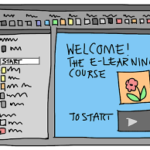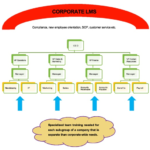by Brian Clark | learning management systems, LMS
Despite the advances in LMS technology and the enormous range of features being added to learning management systems, some organisations still find there are gaps in meeting their learning strategy objectives.
 An organisation facing this reality will often search for a new LMS to meet their needs. This process may be costly in time and financial resources. These are a few ideas that warrant consideration before taking the plunge.
An organisation facing this reality will often search for a new LMS to meet their needs. This process may be costly in time and financial resources. These are a few ideas that warrant consideration before taking the plunge.
- Make sure you have your current LMS configured correctly. Have you changed your configuration to meet new requirements?
- Have you kept pace with updates from your vendor?
- If reporting is not delivering what you need, have you considered integrating with a third party reporting tool?
If you are looking to build a continuous learning framework, the LMS is a great platform to contribute to the framework, but it may need to be supplemented with other tools and processes. You may want to consider these options as well before ditching your current LMS.
- Consider offering micro-learning in your LMS. Make the learning fun and always available by not being linked to sessions and enrolment processes.
- Try using social media to foster greater collaboration and teamwork. The social features in learning management systems vary widely. Social platforms offer a number of ways to engage your people without cost and with a good chance of widespread adoption. YouTube is an incredible resource that is under-utilised for learning across an extended enterprise.
- Offer classroom and online follow-up to your learning programs. We have achieved great results using collaborative communities of practice and expert areas to foster ongoing learning and retention.
- Personalise your learning to individuals and teams. Most learning management systems have the ability to do this to varying degrees. Change the learning programs regularly to keep people interested and engaged.
You can achieve great things as a learning professional using technology and other tools to supplement your LMS. Do not consider the LMS to be the only tool you have to achieve your learning objectives.
by Brian Clark | Uncategorized
 Are you ever stuck for ideas? Is innovation important you and your organisation? This short article by Simon Martin on the Business 2 Community website offers some excellent techniques to unleash the great ideas you already have.
Are you ever stuck for ideas? Is innovation important you and your organisation? This short article by Simon Martin on the Business 2 Community website offers some excellent techniques to unleash the great ideas you already have.
This article starts with an excellent example of Archimedes solving a problem asked by his king to determine if the royal crown was pure gold. There are also good examples using Steve Jobs and Ingvar Kamprad. The article then offers five methods we can all use to generate new ideas and solve problems. These methods include the brainstorm, the mind map, the forced relationship, the scamper method and the reversed thought.
These methods are adaptable for use by yourself, in pairs or in teams. You can read the article here.
by Brian Clark | DOTS Percepium, Employee Engagement, Innovation, talent retention, Uncategorized
Collaborative informal learning can be called all sorts of names. Community of practice is one term that has been around for a long time and many people know generally what a community of practice is and what it is for. When we install our Percepium LMS for a client the ‘out of the box’ name for the module is ‘Expert Area.’ This can of course be changed but we thought this name was a good alternative that simplified the concept a bit.

We designed the Expert Area to be fully integrated with all of the learning and development features in the LMS environment. This ensures that the community of people engaging with an Expert Area may find social collaboration as well as published learning courses, articles and development pathways.
There is really nothing you cannot do with Expert Areas. The subject matter experts may publish to the LMS and offer both elective and mandatory learning activities. The learning activities may be instructor led or online.
When the Expert Areas module is used across an extended enterprise it becomes a powerful tool to engage prospects, customers, resellers and partners with subject matter experts in your business. The usefulness of this scenario is enormous and here are some ways we have implemented this for our clients:
- Support a culture of excellence by identifying and encouraging people to connect and interact with subject matter experts.
- Training resellers and retailers in new products and services.
- Delivering sales training to people who sell your products and services.
- Encourage prospective clients to engage with subject matter experts and their published collateral to engage in educational marketing and begin the process of relationship development.
- Establish communities of practice that include both internal and external experts. This has had a profound impact on innovation and speed to market for one of our clients in particular.
- Prevent ‘brain drain’ when people leave your organisation for any reason. The Expert Areas encourage the capture of best practices and knowledge.
One of our recent clients have adapted the Expert Area module to support an enterprise wide coaching program. Managers were provided training in conducting and managing coaching and mentoring skills using blended learning delivery. The Expert Areas Module was rebranded to Coaching Portal and users now have access to their coaches and mentors in the learning environment.
We dovetailed this with the Development Plans module and now the coaches have line of sight to both the learning activities of the people they are coaching as well as being able to add new development activities as the coaching process advances.
As we upgrade our existing clients and add new clients to our community, we will learn more innovative ways to use this module in organisations. Expert Areas is an example of how uniquely designed DOTS Percepium LMS is to provide maximum configurability without software bloat.
If you would like to learn more about Communities of Practice, Expert Areas and our latest third generation Learning Management System, please get in touch.
by Brian Clark | Announcements, DOTS Percepium
We are pleased to announce that the State of Hawaii and the State Procurement Office has selected the Percepium Learning Management System [LMS] for training and competency management. (more…)
by Brian Clark | Business Process, learning management systems, LMS
Specific autonomous training that harmonises with corporate training objectives.
Has there ever been an example when one size truly fits all? A label that’s been stamped on everything from hats and clothing to table cloths and diapers, this type of statement couldn’t be farther from the truth.
These days it’s all about customisation and this is critical into the world of effective training. Studies show that learners may retain information very differently and this has been one of the key drivers in the widespread rapid adoption of blended learning.
This concept also holds true from a trainer’s perspective — one size does NOT fit all when it comes to team training. It is imperative that business units across an organization are equipped with the right tools to meet their specific goals and objectives. And, this often comes with unique training needs that do not always fall under the same organizational LMS umbrella.

Training should be tailored to team needs.
No two teams are alike, nor their training needs.
Every organisation has some type of hierarchy or chain of command that functions along the idea that all the individual units work together for the good of the whole. However, would it be safe to assume that sales and marketing will have very different training needs than manufacturing, safety and HR? Or, IT versus customer service?
While there will always be some cross-over in training needs, there are also a significant number of situations where specific teams need a tailored solution. Common problems teams face include:
- A lack of administrative access or control of the corporate LMS.
- The corporate LMS is too complicated for small team needs.
- The LMS does not offer administrative tools for specific user populations.
- There is an inability to customise learning paths and training for specific team requirements.
If your business is not delivering tailored training and/or performance support to specific teams and groups you may consider the following:
- Review the capabilities of your LMS to determine if you can deliver tailored training and user experiences to specific teams and groups.
- If your LMS has these capabilities but they are not utilised, consult your vendor or support provider to determine the scope of activating this set of capabilities.
- If your LMS does not have this capability you may wish to explore other options. The use of learning management systems across the extended enterprise is now more common and proving an effective business development and competitive differentiator.
If you would like further information on this subject please get in touch with us. We can provide ideas on how to roll out tailored training and show you some e-learning modules designed for these types of scenarios. You may also wish to have a look at an LMS configured for an extended enterprise deployment.
 An organisation facing this reality will often search for a new LMS to meet their needs. This process may be costly in time and financial resources. These are a few ideas that warrant consideration before taking the plunge.
An organisation facing this reality will often search for a new LMS to meet their needs. This process may be costly in time and financial resources. These are a few ideas that warrant consideration before taking the plunge.


